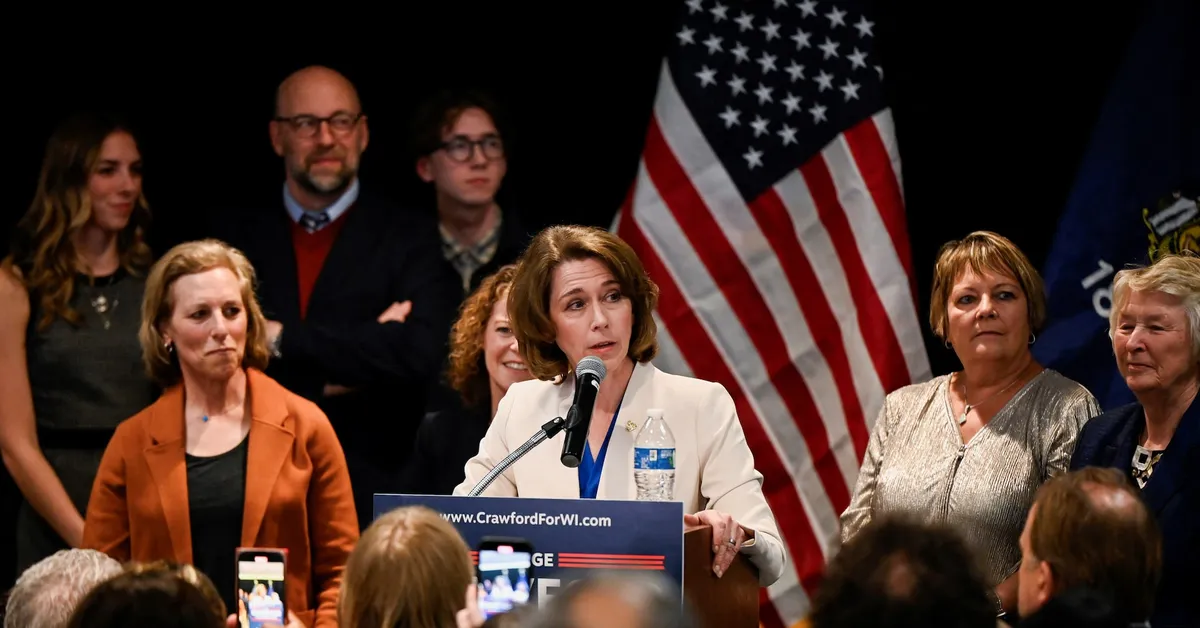
Wisconsin voters made a significant decision on April 1, electing Susan Crawford to the state Supreme Court. This victory preserved the court's 4-3 liberal majority, marking a notable setback for both President Donald Trump and billionaire entrepreneur Elon Musk, who had financially backed Crawford's conservative opponent, Brad Schimel.
The election has been characterized as a pivotal referendum on Trump's presidency. It turned into the most expensive judicial contest in U.S. history, with over $90 million spent collectively by candidates, state parties, and various outside groups, according to the Brennan Center at New York University. This staggering amount illustrates the heightened stakes involved in the race.
Crawford, currently serving as a county judge, convincingly defeated Schimel, a former Republican state attorney general, by a margin of 191,000 votes, representing a 9-point lead with approximately 88% of the votes counted. Following the election results, Schimel conceded both in a phone call to Crawford and in a speech to his supporters.
With the court's balance at stake, Musk and associated political groups invested more than $21 million to support Schimel. In her campaign, Crawford positioned the election as a battle against the influence of out-of-state billionaires, stating, "I've got to tell you, as a little girl growing up in Chippewa Falls, I never could have imagined that I'd be taking on the richest man in the world for justice and Wisconsin. And we won!" This declaration resonated with many supporters during her celebration in Madison, the state capital.
Trump opted to remain silent regarding the Supreme Court election results on social media, instead celebrating the passage of a separate Wisconsin ballot measure that mandates stricter voter identification. In contrast, national Democrats heralded the Wisconsin result as a strategic victory, viewing it as a step towards reclaiming the House of Representatives in the upcoming 2026 elections. Ken Martin, chair of the Democratic National Committee, asserted, "Tonight, the people of Wisconsin squarely rejected the influence of Elon Musk, Donald Trump, and billionaire special interests."
Many Wisconsin voters appeared to recognize the election's implications beyond their state borders. West Roberts, a 26-year-old Crawford supporter, emphasized, "Supporting everyday people is more important than people who were supporting Elon Musk or the multi-billionaires." Meanwhile, retiree Gary Christenson expressed his support for Schimel, cautioning that a liberal court could undermine Trump’s efforts to reduce government size.
In another electoral test of Trump's influence, two Republican candidates in Florida secured victories in special elections to fill U.S. House vacancies created by Trump's cabinet appointments. These outcomes reinforced the Republican majority in the House at 220-213. Republicans had anticipated retaining both seats, making the elections a point of interest to see how close Democrats could come to competing.
The Wisconsin Supreme Court is poised to make critical rulings regarding voting rights and election regulations leading up to the 2026 midterms and the 2028 presidential election. Given that Trump won Wisconsin by a razor-thin margin of less than a percentage point in November, the court's decisions could significantly impact the state’s political landscape. Moreover, the court may address issues like abortion rights and revisit a contentious Republican-backed law that curtailed collective bargaining rights for public employee unions.
Musk emerged as a prominent figure in this election cycle, actively campaigning for Schimel and asserting that the future of Western civilization hinged on the court's rulings, particularly concerning redistricting. The outcomes of these decisions could alter the balance of power between Republicans and Democrats in the closely divided U.S. House of Representatives, affecting Trump's governance.
Crawford's campaign received financial backing from several high-profile Democratic megadonors, including philanthropist George Soros and Illinois Governor J.B. Pritzker. This support played a crucial role in her ability to challenge the substantial financial resources deployed by Musk and his allies.
The Wisconsin Supreme Court election results signal a significant moment in the ongoing political dynamics within the state and beyond, reflecting broader national sentiments about the influence of wealth in politics and the direction of judicial decisions in pivotal issues.